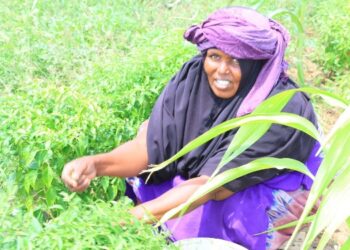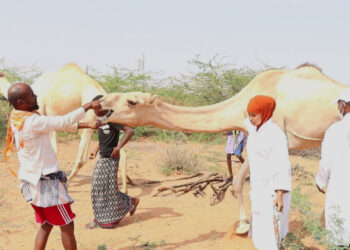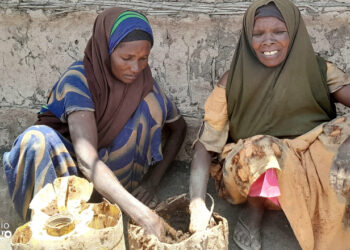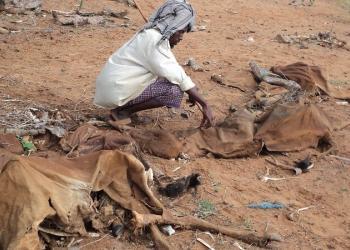(ERGO) – The livestock business and all the people who depend on it in Borama district have been dealt a severe blow by two years of drought that have gripped this part of Awdal region.
Borama livestock market, the largest in the region, used to be abuzz with thousands of prime animals for sale including camels, goats and cattle, many being sold for export.
Radio Ergo’s local reporter visited the market this week to find only around 150 goats for sale. Few were in good condition, and most were destined for slaughter for local consumption.
Rowda Muse Olhaye, a herder from Qol-ujedo, 30 km west of Borama, described the devastating toll that two years of drought had taken on her herd and her livelihood.
“I have brought only one goat to sell. I used to bring 20 to 30 goats to the market before the drought. Now I have only 20 goats left in my herd and this goat was the only one in good condition to sell,” she said.
She has lost 180 goats over the past two years.
The few animal on sale are fetching higher prices than previously due to scarcity. A goat which used to sell at $50 three years ago is now sold at $62.
Abdirashid Ahmed Elmi has been a broker in Borama market for 18 years. He told Radio Ergo that he was struggling to feed his 11 member family.
“Most times I go back to my family with nothing in my pocket, sometimes I get $1.5 from the few people whose animals are sold for slaughter. I used to rely on earnings of $8 daily three years ago,” he said.
Abdirashid said some of his children dropped out of school as he was unable to pay their school fees. “The situation of my family is not good at all, because the livestock market was my only source of income, I can’t even feed my family.”
The few animals being sold in the market are mainly being trucked in from Ethiopia. Asli Abdi Qalib, a livestock trader, takes 10 days to transport goats from Oromia regional state in Ethiopia to Borama.
“I used to bring to the market more than 50 goats and 10 cows to sell each time but now I only bring five thin goats,” she said.
Asli said four of her five school-aged children were out of class as she could no longer pay their fees. “I put all my effort to one girl who is in the university,” she added.
Borama market used to be the source of large numbers of camels, bulls and sheep purchased for export via the port of Berbera to the Gulf. Those whose lives depend on it can only hope the market will return to vibrancy if the animals get better pasture in the current Gu’ season.











